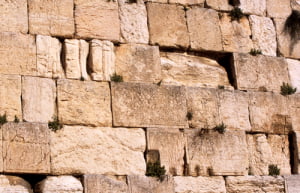 Never would I have expected that the most segregated activity in a different religious tradition would be one of the most spiritual activities for me in our journey this day.
Never would I have expected that the most segregated activity in a different religious tradition would be one of the most spiritual activities for me in our journey this day.
Yet, when I met the Wailing Wall this morning, I didn't want to leave.
If the truth be told, I was actually dreading going to the Wailing Wall or Western Wall as it is called in Jewish tradition. If you have read posts of mine in the past like this one you know that being a part of an exclusive tradition is something that bothers me a lot.
I assumed I would meet the segregation of the Wailing Wall with frustration, hurt and annoyance. "Why can't I go pray with the men, especially with my husband?" would be my cry.
While I fully respect the Jewish traditions and their right to practice their faith however they choose, my heart still wanted to be included as an equal. I could just imagine myself with tears in my eyes as I, the only female in the group, found my way to the "women's" portion of the wall alone. I knew it would probably be an experience of sharing in the sorrows of the injustice and persecution that millions of my sisters have felt through the years of male dominated and centric religions.
However, as I walked through the former temple court into the quarters with the sign "Women" above it, I found tears welling up in my eyes for a completely different reason. In fact, I was glad to be surrounded only by my sisters.
There was something incredibly holy that came upon me as I surrendered to whatever the experience could offer. The space felt incredibly safe and inviting, even though I was a Christian pastor dressed like an American tourist without a prayer book in my hands. I did bring, however, prayers folded up on small strips either given to me or Kevin by friends and some prayers of our own. With each prayer slip I placed in the wall, I said words over the needs written down. As soon as I found my hands empty of prayer slips, a great sense of relief came over me. Though my instinct was to take the slips out of the wall one more time to pray for them again, as soon as they were in the cracks of the wall, I knew they were spiritually gone from me: they were now God's.
Soon after this, I felt a strong need to cover my head with my scarf and sit in one of the plastic chairs sitting close to the wall. There was no one official present asking me to cover my head, but it seemed like the right thing to do in order to take in the Presence of what being at a site full of so many hopes, so many sorrows, so many worries meant for generations before me and right then at that very moment.
As I looked upon the crowd of my sisters surrounding me with tears rolling down my cheeks, I was truly glad that no men were present. There are unique sorrows in what it means to be a woman and it felt right to be able to grieve alongside those who understood me the most.
I saw an African woman kneeling, leaning toward the wall praying with a rosary. I saw Euro-American women kissing the wall as if it was her long-lost lover. I observed a woman who appeared to have some sort of special needs embracing a teenage traveling companion, so overcome by sadness that she could hardly stand up (probably because she had greater sensitivity than all of us to truly take in the raw emotions present in that space). I saw a Jewish woman rocking back and forth with a prayer book in her hands with more devotion toward a holy book than I've ever seen toward any Christian text.
And, I didn't want to leave. I wanted to stay and cry and cry and truly invite any sadness in me to come out. Yet the longer I sat in the chair, the more I felt the sense of the Spirit saying to me, "Go in Peace."
My time with the Wailing Women of Jerusalem was blessed. I left with a renewed sense that Christians in general get it all wrong when it comes to grief. Yes, we have hope in difficult circumstances and death of love ones because of Jesus, yet, still we need to be in communities of those who will weep with us from time to time. I think it is the kind of healing for our souls that the goodness of the Lord can bring us on our way.
I began thinking, might we need to build wailing walls of our own in spaces in our religious centers for worship?
Though such walls may not be linked to important landmarks in our religious history and have a significance like the Western Wall in terms of sacred space, might these spaces become life-giving communion for people of all faith traditions?
After all, Jesus said: "Blessed are they who mourn. For they will be comforted."